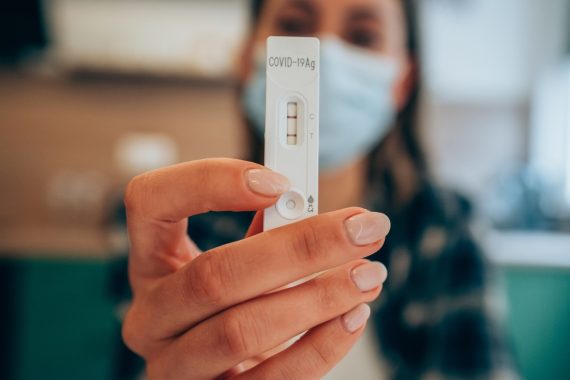First Covid symptoms develop just two days after infection, shows study

Initial findings from the UK Human Challenge Programme have shown some key insights into the course of a Covid infection, say researchers.
The study which infected 36 young healthy male and female volunteers who had no previous immunity found that symptoms develop faster than previously thought at around two days after first contact with the virus.
First appearing in the throat, the infectious virus peaks about five days into where at that point it is significantly more abundant in the nose than the throat, the findings published as a pre-print show.
The results – based on the original SARS-CoV-2 strain – also suggest that lateral flow tests are a reassuringly reliable indicator of whether infectious virus is present, the team reported.
During the study which was done in a specialist unit at the Royal Free Hospital in London, there were no severe symptoms or clinical concerns among those who had volunteered, who were aged between 18 and 30 years and were given a low dose of the virus.
In all 18 became infected and 16 went on to develop mild-to-moderate cold-like symptoms, including a stuffy or runny nose, sneezing, and a sore throat. Some experienced headaches, muscle/joint aches, tiredness and fever, the researchers said.
The study also reported that 13 volunteers temporarily lost their sense of smell which returned to normal within three months in all but three who are continuing to show improvement.
Chief investigator Professor Christopher Chiu, from the Institute of Infection at Imperial College London and chief investigator on the trial, said: ‘Our study reveals some very interesting clinical insights, particularly around the short incubation period of the virus, extremely high viral shedding from the nose, as well as the utility of lateral flow tests, with potential implications for public health.’
Previous estimates of incubation period had been around five to six days rather than the 42 hours seen on average in the study.
Positive LFTs correlated well with lab-confirmed detection of virus from swabs throughout the course of infection, including in those who were asymptomatic but were less effective in picking up lower levels of virus at the very start and end of infection.
More work is being planned to see why some people became infected and others did not and develop a challenge virus using the Delta variant.
Professor Chiu added: ‘While there are differences in transmissibility due to the emergence of variants, such as Delta and Omicron, fundamentally, this is the same disease and the same factors will be responsible for protection against it.
‘From the point of view of virus transmission related to the very high viral loads, we are likely if anything to be underestimating infectivity because we were using an older strain of the virus.’
Dr Sir Michael Jacobs, consultant in infectious diseases at the Royal Free London, said: ‘The trial has already provided some fascinating new insights into SARS-CoV2 infection, but perhaps its greatest contribution is to open up a new way to study the infection and the immune responses to it in great detail and help test new vaccines and treatments.’
Pulse July survey
Take our July 2025 survey to potentially win £1.000 worth of tokens

Visit Pulse Reference for details on 140 symptoms, including easily searchable symptoms and categories, offering you a free platform to check symptoms and receive potential diagnoses during consultations.
Related Articles
READERS' COMMENTS [1]
Please note, only GPs are permitted to add comments to articles












According to Dave in the gym it’s 14 days after, and Emily who said it’s 7 days before, actually.